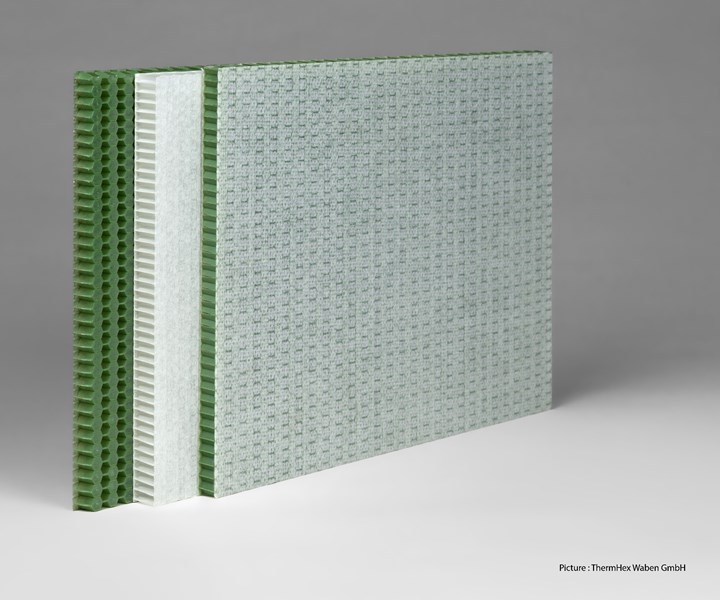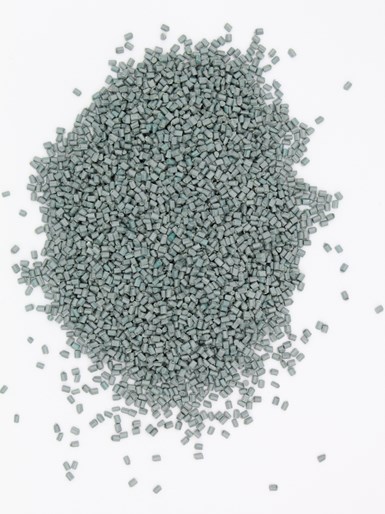EconCore licenses recycled PET honeycomb core technology
The company’s rPET honeycomb core is made from more than 95% recycled PET and is reported to outperform PP honeycomb cores.

rPET honeycomb sandwich panel. Source | EconCore
Core technologies specialist EconCore (Leuven, Belgium) is now offering its recycled polyethylene terephthalate (rPET) honeycomb for commercial licensing. The company reports two years of successful research to optimize processing of the reusable resource-based polymer into its continuously produced honeycomb core. EconCore was awarded a grant to fund research over a two-year period from Flanders Innovation and Entrepreneurship (VLAIO), a government agency that finances strategic and industrial research.
Recycled PET honeycomb cores, with the widespread availability of collected plastic, including bottle grade rPET flakes, offer potential as an eco-alternative core material. The material is also reported to show superior temperature resistance and mechanical properties compared to conventional thermoplastic core materials. According to EconCore, the biggest benefit to this product is a substantial decrease in CO2 emissions, especially combined with the reductions that already come from using honeycomb core technology.

rPET flakes. Source | EconCore
The company’s rPET honeycomb core is typically made from more than 95% recycled PET from a variety of sources such as bottles and food packaging. According to EconCore, this is a cost-effective solution due to not requiring much pre-production processing to achieve stable temperature and strength performance that outperforms polypropylene (PP) honeycombs.
For this product, EconCore is partnering with MEAF Machines (Yerseke, Netherlands), which designs, develops and builds extrusion machines for the global packaging and plastics processing industry. According to MEAF, the partners optimized the production process to extrude up to 1,200 kg per hour while using only 0.20 kWh per kg.
Furthermore, EconCore says its ThermHex technology plays an essential role in enabling the use of honeycomb materials in cost-sensitive applications. Applications include the sidewalls of delivery trucks and trailers, vehicle interiors such as parcel shelves, headliners, boot/trunk floors and other interior panels. It can also be used for concrete casting molds and facade panels in the commercial construction and building sector.
EconCore’s rPET honeycomb cores are set to be used in a project by Eindhoven University of Technology, which will design and build a road-legal car completely made from waste, recyclable and biodegradable material by June 2020. EconCore is a gold sponsor of the project and its product will be used for the chassis. The project is called Luca and is part of a project called TU/ecomotive.
Related Content
-
Bio-based acrylonitrile for carbon fiber manufacture
The quest for a sustainable source of acrylonitrile for carbon fiber manufacture has made the leap from the lab to the market.
-
PEEK vs. PEKK vs. PAEK and continuous compression molding
Suppliers of thermoplastics and carbon fiber chime in regarding PEEK vs. PEKK, and now PAEK, as well as in-situ consolidation — the supply chain for thermoplastic tape composites continues to evolve.
-
Sulapac introduces Sulapac Flow 1.7 to replace PLA, ABS and PP in FDM, FGF
Available as filament and granules for extrusion, new wood composite matches properties yet is compostable, eliminates microplastics and reduces carbon footprint.

.jpg;width=70;height=70;mode=crop)














